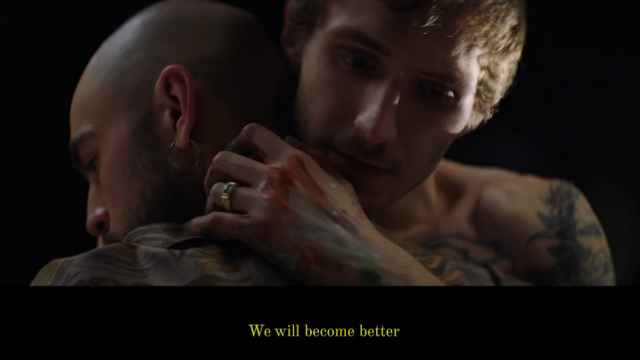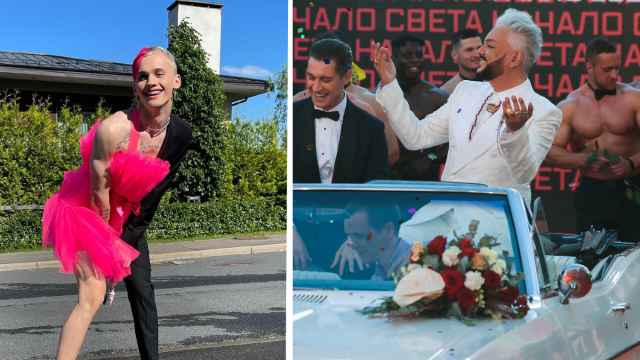A Russian music channel has been fined for displaying “LGBT propaganda” by airing a music video by popular pro-war singer Nikolai Baskov, the independent Vyorstka news website reported Wednesday.
Moscow’s Tagansky District Court determined that the video for Baskov’s 2012 single “Strannik” (Wanderer), which depicts an imagined orgy in the Roman Empire, contains “signs of a romantic interpersonal relationship” between the video’s protagonist and another man.
The court found the entertainment channel Tochka TV guilty of “LGBT propaganda” and fined it 1 million rubles ($11,000), according to Vyorstka.
The judge explained the ruling by stating that “the protagonist’s jealousy is not toward a female, but a male who has cheated on the protagonist with a female.”
The court added that the video “takes place against the backdrop of an atmosphere of hedonism and debauchery,” which it said “is realized primarily through repeated scenes of non-verbal sensory interaction between two persons of the same biological sex (female) in a sexual context.”
Baskov, 47, has regularly defended Russia’s February 2022 invasion of Ukraine, describing it as “the end of genocide and the prevention of an attack on Russia.”
He was among several Russian singers who pledged to pay a 1-million-ruble reward to soldiers who destroyed Western-made tanks in Ukraine.
President Vladimir Putin awarded Baskov the Order of Honor in October “for merits in the advancement of national culture and art.”
LGBT rights have gradually eroded in the decade since Putin signed a law banning LGBT “propaganda” toward minors in 2013. Last year, Russia expanded the law to ban “LGBT propaganda” aimed at any age.
Russia’s Supreme Court this month banned the so-called “international LGBT movement” — which does not formally exist — on claims of extremism.
Individuals face a maximum of six years in prison if convicted of involvement in an “extremist” organization.
A Message from The Moscow Times:
Dear readers,
We are facing unprecedented challenges. Russia's Prosecutor General's Office has designated The Moscow Times as an "undesirable" organization, criminalizing our work and putting our staff at risk of prosecution. This follows our earlier unjust labeling as a "foreign agent."
These actions are direct attempts to silence independent journalism in Russia. The authorities claim our work "discredits the decisions of the Russian leadership." We see things differently: we strive to provide accurate, unbiased reporting on Russia.
We, the journalists of The Moscow Times, refuse to be silenced. But to continue our work, we need your help.
Your support, no matter how small, makes a world of difference. If you can, please support us monthly starting from just $2. It's quick to set up, and every contribution makes a significant impact.
By supporting The Moscow Times, you're defending open, independent journalism in the face of repression. Thank you for standing with us.
Remind me later.






